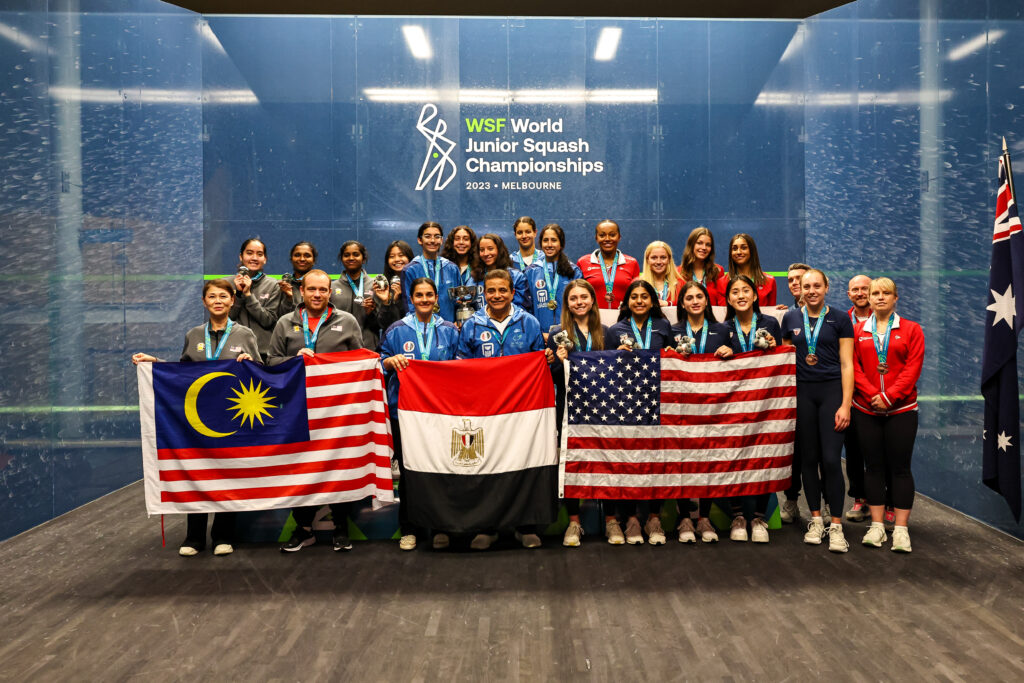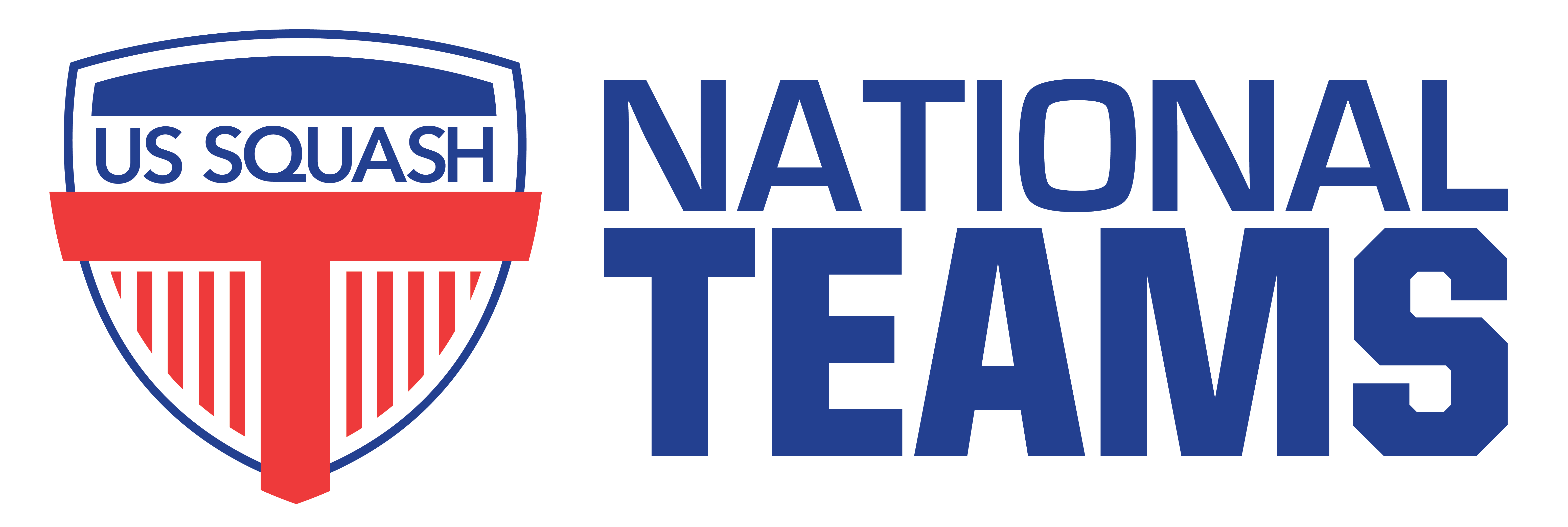
Team USA returned to the World Junior Women’s Team Championship podium for the first time since 2015, and produced a record-setting six Americans in the last sixteen of the World Junior Men’s and Women’s Individual Championships, July 18-29, in Melbourne Australia.
The 2023 edition of the World Juniors opened with the annual World Junior Men’s and Women’s Individual Championships, July 18-23, followed by the biennial World Junior Women’s Team Championship July 24-29 at the Melbourne Sports Center.
The U.S. squad was led by U.S. Junior Women’s Head Coach Scott Devoy, U.S. Junior Men’s Interim Head Coach Simba Muhwati, U.S. Junior Women’s Assistant Coach Margo Prow and U.S. Junior Men’s Assistant Coach Charlie Johnson.
The U.S. Junior Women’s Team consisted of Caroline Fouts, Riya Navani, Madison Ho and Emma Trauber in both the team and individual competitions, and Caroline Eielson and Sonya Sasson competing in the individuals. The U.S. Junior Men’s Team included Rishi Srivastava, Hollis Robertson, Zane Patel, Varun Chitturi, Thomas Soltanian and Arhan Chandra.
After finishing in fifth and sixth place in 2017 and 2019, respectively–the U.S. Junior Women’s team entered the competition with the goal of returning to the podium having recorded second place finishes in 2011, 2013 and 2015.
The U.S. Junior Women topped Pool C including a pivotal win over five seeds England with all four women providing important victories. The third-seeded U.S. then went on to defeat six seeds India in the 1-8 playoffs to set up a semifinal against two seeds Malaysia. Malaysia edged the U.S. in a close semifinal contest to consign the U.S. to a bronze medal finish.
“Our third place finish was bittersweet, to be honest,” Devoy said. “It was a great result and the team came together well. It was so, so close that it definitely stings not to get to the final. It is better to feel like this though, knowing you are more than good enough to succeed at the highest level. I honestly believe that if we played that tie with Malaysia 10 times, we win 8. The team all played really well, and in any difficult event like this there will be struggles. The way the girls responded to these challenges was impressive, backing up some tough results and matches with strong performances was a pretty consistent thing through the team. The team pushed each other every day, on and off court. They brought out the best in each other; as competitors trying to make the team to then teammates challenging each other to get better.”
Top seeds Egypt would go on to defeat Malaysia in the final to earn their tenth overall and eighth consecutive World Junior Women’s Team Championship title.
“The expectation now, is that individually and collectively we are more than good enough to succeed at the highest level,” Devoy added. “Knowing that we have players that can adapt to handle the many challenges that comes with playing against the best players should give us confidence moving forward. The example of the teams in the past and this team should inspire the teams to come, to take on the biggest challenges and not be afraid of the biggest moments. Huge thanks to the team, US Squash and fellow coaches for all their efforts in making this a successful trip, on and off court.”
Team USA achieved historic results in the World Junior Individual competitions with six players reaching the last sixteen–including a record three men.
The U.S. contingent made a strong start in the opening rounds of play, producing a clean slate of twelve first round wins, and ten of twelve Americans reaching the third round.
All six American women–including Sonya Sasson, Emma Trauber, Caroline Eielson, Caroline Fouts, Riya Navani and Madison Ho–reached the third round courtesy of 3-0 victories.
Thomas Soltanian and Arhan Chandra both recorded first round wins before falling against higher seeded opponents in the second round.
All five seeded Americans fulfilled their seedings and reached the round of sixteen.
9/16 seeds Navani and Ho both fulfilled their seedings without dropping a game before exiting the main draw against higher seeds in the round of sixteen. Fouts, a 5/8 seed, dropped just one game on her way into her first World Juniors quarterfinal. The U.S. junior champion lost out two Egypt’s two seed Fayrouz Abouelkhir.
Varun Chitturi was one of just two unseeded men’s players to reach the last sixteen, upsetting Ireland’s 9/16 seed Dylan Moran in five games. After exiting the main draw against a 3/4 seed, Chitturi continued his impressive tournament in the consolation draws where he defeated a 5/8 seed to place eleventh and record five wins in total.
9/16 seeds Hollis Robertson and Rishi Srivastava both prevailed in five-game encounters in the third round against Ecuador’s Javier Lopez and Pakistan’s Huzaifa Ibrahim, respectively. Robertson then recorded one of the biggest results of the individual tournament, knocking out defending champion and two seed Rowan Damming in five games. Robertson narrowly missed out on the semifinals, falling in a five-game quarterfinal against French 9/16 seed Melvil Scianimanico. Robertson would go on to place seventh overall. Srivastava exited the main draw against Egypt’s 5/8 seed Salman Khalil. Srivastava reached the 9-16th playoff final to place tenth overall.
Robertson, Srivastava and Chitturi became the first three American men to place in the world’s top twelve together.
After first and second round wins, Zane Patel exited the main draw at the hands of England’s top seed Jonah Bryant. Patel would go on to win the 25-32 playoff and place twenty-fifth.
“We were dealt difficult individual draws and seedings, but credit to the entire team for stepping up and producing some breakthrough results,” said Simba Muhwati, U.S. Junior Men’s Interim Head Coach. “As coaches we wanted the teams to focus on one thing at a time and trust the process leading into the tournament, and this group embraced that approach. I’ve been to World Juniors where the U.S. came in last place, and now you can reasonably say that our junior men and women are both top four teams in the world. I believe there will be a day where Team USA will beat Egypt and be the best team in the world. We’re inching closer and closer and it’s really motivating. It’s taking one step at a time in the right direction and one milestone at a time to get there. The team all played really well, but ultimately it’s the bigger picture. The U.S. is now a force in junior squash, and this is one of the tournaments that will help get us up the ladder.”
The 2024 World Juniors will feature the biennial World Junior Men’s Team Championship alongside the annual World Junior Men’s and Women’s Individual Championships.


